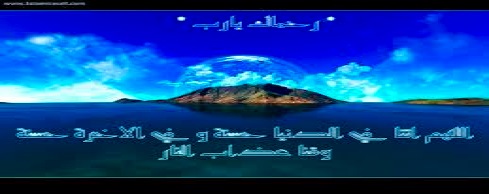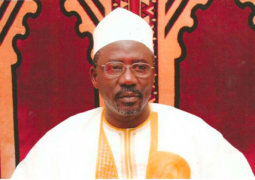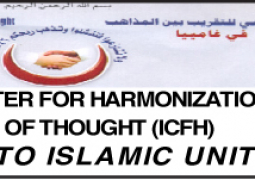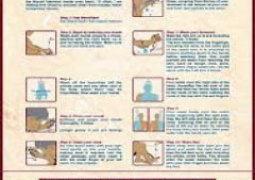
Joining the assemblies or circles of zhikr is a commendable practice as shown by the following hadith: Ibn ‘Umar reported, “The Prophet, peace be upon him, said, ‘when you pass by a garden of Paradise, avail yourselves of it.’ The Companions asked, ‘What are the gardens of Paradise, O Messenger of Allah? ‘The Prophet, peace be upon him, replied, ‘The assemblies or circles of zhikr. There are some angels of Allah who go about looking for such assemblies of zhikr, and when they find them they surround them’.” Muslim reports that Mu’awiyyah said, “The Prophet, peace be upon him, went out to a circle of his Companions and asked, ‘What makes you sit here?’ They said, ‘We are sitting here in order to remember Allah and to praise Him because He guided us to the path of Islam and he conferred favors upon us.’ Thereupon he adjured them by Allah and asked if that was the only purpose of their sitting there. ‘They said, By Allah, we are sitting here for this purpose only. ‘ At this the Prophet, peace be upon him, said, ‘I am not asking you to take an oath because of any misapprehension against you, but only because Gabriel came to me and informed me that Allah, the Exalted and Glorious, was telling the angels that He is proud of you’.” Abu Sa’id Al-Khudri and Abu Hurairah reported that the Prophet, peace be upon him, said, “When any group of men remember Allah, angels surround them and mercy covers them, tranquility descends upon them, and Allah mentions them to those who are with Him.”
Qatadah reported that Anas ibn Malik said, “The Prophet, peace be upon him, said, ‘When a human is laid in his grave and his companions return and he hears their footsteps, two angels will come to him and make him sit and ask him, “What did you say about this man, Muhammad, may peace be upon him?” He will say, “I testify that he is Allah’s servant and His Messenger.” Then it will be said to him, “Look at your place in Hell-Fire. Allah has exchanged for you a place in Paradise instead of it”.’ The Prophet, peace be upon him, added, ‘The dead person will see both his places. As for a non-believer or a hypocrite, he will respond to the angels, “I do not know, but I used to say what the people used to say!” It will be said to him, “Neither did you know nor did you seek guidance from those who had knowledge.” Then he will be hit with an iron hammer between his two ears, and he will cry and that cry will be heard by all except human beings and Jinns’.” (Bukhari and Muslim)
Excellence of Pronouncing La llaha illa-Allah Sincerely
Abu Hurairah reported that the Prophet, peace be upon him, said, “When a servant of Allah utters the words la ilaha illa’Allah (there is none worthy of worship except Allah) sincerely, the doors of heaven open up for these words until they reach the Throne of Allah, so long as its utterer keeps away from the major sins.’’ (Tirmizhi, who says it is a Hasan Gharib hadith) Abu Hurairah also reported that the Prophet, peace be upon him, said, “Renew your faith.” “How can we renew our faith?” they asked. The Prophet, peace be upon him, replied, “Say always, ‘La ilaha illAllah’.’’ (Reported by Ahmad with a sound chain of authorities) Jabir reported that the Prophet, peace be upon him, said, “The best remembrance of Allah is to repeat La ilaha ill-Allah and the best prayer is Alhamdu li-Allah (All Praise is due to Allah).’’ (Reported by Nasa’i, Ibn Majah, and Al-Hakim, who considers its chain sound)
Excellence of Tasbih, Tahmid, Tahlil, Takbir and Other Supplications
Abu Hurairah reported that the Prophet, peace be upon him, said, “There are two phrases that are light on the tongue but heavy on the scale of rewards and are dear to (Allah) the Gracious One. These are, subhanallah wa bi-hamdihi (All Glory is to Allah and all Praise to Him), and subhanallah al-azim (Glorified is Allah, the Great).’’ (Muslim, Bukhari, and Tirmizhi) Abu Hurairah also reported that the Prophet, peace be upon him, said, “I love repeating Subhanallah, Wal-hamdulillah, Wa la-Ilaha Ill-Allah, wa-Allahu akbar (Glorified is Allah, all praise is due to Allah, and there is no God but Allah, Allah is the greatest) more than all that the sun shines upon.’’ (Muslim and Tirmizhi)
Abu Zharr reported, “the Prophet, peace be upon him, said, ‘Shall I tell you the words that Allah loves the most?’ I said, ‘Yes, tell me, O Messenger of Allah.’ He said, ‘the words most dear to Allah are Subhan-Allah wa Bihamdihi (Glorified is Allah with all praise due to Him)’.” This is narrated by Muslim and Tirmizhi. In Tirmizhi’s version, we also find the following: “The words most dear to Allah which He has chosen for His angels are Subhana Rabbi wa Bihamdihi, Subhana Rabbi wa Bihamdihi (Glorified is my Lord with all praise due to Him, Glorified is my Lord with all praise due to Him).” Jabir reported that the Prophet, peace be upon him, said, “Whoever says Subhan-Allah-al-Azim wa bihamdihi (Glorified is Allah, the Great, with all praise due to Him), will have a palm tree planted for him in Paradise.’’(Reported by Tirmizhi who considers it a sound hadith.)
Abu Sa’id reported that the Prophet, peace be upon him, said, “Perform the enduring goods deeds more frequently.” The asked, “What are these enduring deeds?” The Prophet, peace be upon him, replied, A-Takbir, (Saying Allahu Akbar i.e., Allah is the greatest) At-Tahlil, (Saying la ilaha ill-Allah, i.e., there is no god but Allah) At-Tasbih, (Saying subhan-Allah meaning, Exalted and far removed is Allah from any weakness) al-hamdu li-Allah, (This means: All praise belongs to Allah alone) and la Hawla Wala Quwwata Illa Billah. (There is neither power nor any authority except with the permission of Allah) This is reported by An-Nasa’i and Al-Hakim, who consider its chain of authorities sound. Abdallah reported that the Prophet, peace be upon him, said, “During the Night Journey I met Ibrahim who said to me, ‘O Muhammad, convey my greetings to your Ummah, and tell them that the Paradise is of pure land, its water is sweet, and its expanse is vast, spacious and even. And its plants are Subhan’Allah, Wal-hamdulillah, Wala Ilah Illallah, wa-Allahu Akbar’.’’ Samura ibn Jundab reported that the Prophet, peace be upon him, said, “The dearest phrases to Allah are four: Subhan Allah, (Glorified is Allah), al-Hamdulillah (All praise be to Allah), Wa la ilaha ill-Allah (There is no God but Allah), and Allah-o-Akbar (Allah is the Greatest). There is no harm in beginning them in any order you choose while remembering Allah.’’ (Muslim) Abu Mas’ud reported that the Prophet, peace be upon him, said, “If anyone recites the last two verses of Surat al-Baqarah, they will suffice for him,’’ (Bukhari and Muslim) that is, these two verses will bring him a reward equivalent to that of a night prayer, and will safeguard him from any hurt during that night. Ibn Khuzaimah in his Sahih has also mentioned it under the chapter “The Recitation of the Qur’an Equivalent in Reward to a Night Prayer.” Abu Sa’id reported that the Prophet, peace be upon him, asked, “Can anyone of you recite a third of the Qur’an during the night?” The Companions considered this rather difficult and they said, “Who among us can do so, O Prophet of Allah?” Thereupon the Prophet, peace be upon him, said, “(Say:) He is Allah, the One and Only; Allah, the Eternal, Absolute; He begetteth not, nor is he begotten; and there is none like unto Him.’’ (The reference here is to recitation of Surah 112 (Suratul Ikhlas) of the Qur’an, which the Prophet, peace be upon him, described as equivalent to reciting one-third of the Qur’an. This hadith is reported by Bukhari, Muslim, and Nasa’i)
Abu Hurairah reported that the Prophet, peace be upon him, said, “Whoever says, ‘La llaha illa-Allahu wahdahu la sharika lahu, lahul-mulku wa lahul-hamd wa huwa ‘ala kulli shai’in qadir’ a hundred times during a day will have a reward equivalent to the reward for freeing ten slaves. Besides, a hundred good deeds will be recorded for him and a hundred bad deeds of his will be wiped off, and it will be a safeguard for him from Satan that day until evening, and no one will be better in deeds than such a person except he who does more than that.’’ (Bukhari, Muslim, Tirmizhi, Nasa’i, and Ibn Majah) In the version of Muslim, Tirmizhi, and Nasa’i, we find this addition: “And whoever says subhan Allah wa bihamdihi a hundred times during a day, will have all his sins wiped off even if they were as numerous as the foam on the surface of the sea.”
To be continued




